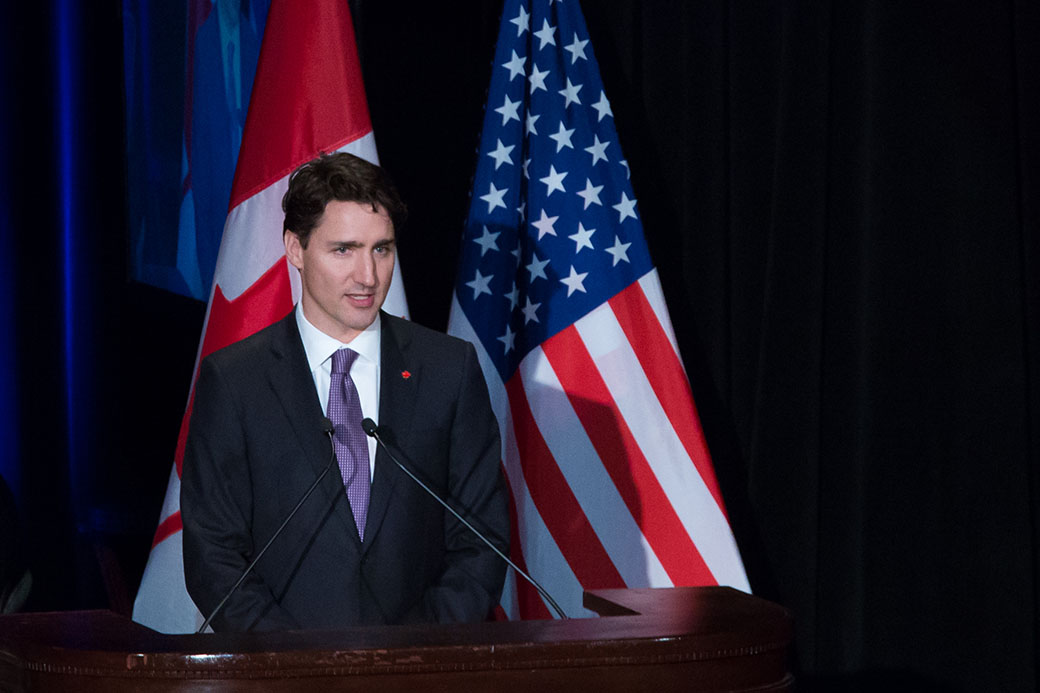Canada ended the Second World War as the third-ranking world power.
Though greatly eclipsed by the United States (and the Soviet Union), Canada was positioned ahead of the traditional great powers, France, Germany, the U.K. and China. Weakened by war, none were able to play a substantial role on the world scene.
At the crucial juncture when postwar direction was set and the Bretton Woods institutions, the UN and NATO established, policies championed by the U.S. dominated the world.
Enjoying a brief period of enhanced stature because of its strong (centrally planned) wartime economy, Canada developed a “quiet diplomacy” approach to the world hegemonic power.
The idea was to use close relations with the U.S. to exert influence on the world scene.
By intervening early, behind the scenes in Washington, before American policy was fully developed, Canada could play an independent role in the world.
Quiet diplomatists did not openly criticize the U.S. for fear of losing the access to power that ensured Canada could exert some influence on the course of events.
As explained by scholars such as the late Peyton Lyon, to the extent other countries recognized that Canada was uniquely placed to influence the United States, Canada gained influence itself. Since all recognized U.S. preponderance, recognition of Canada’s access to power amounted to acknowledgement of Canadian importance.
Quiet diplomacy built on the wartime collaboration between the two countries both before and after the U.S. (late) entry into the war. It reached a high point with the 1957 Nobel Peace Prize going to the former Canadian External Affairs Minister Lester Pearson.
Quiet diplomacy assumed that Canadians had an understanding of world politics that was valuable to the U.S., and appreciated in Washington, and that Canadians could make things happen at the UN and elsewhere.
The quiet diplomacy era continued for the most part until the arrival of Pierre Elliott Trudeau as Liberal prime minister in 1968.
PET held the approach in low regard, preferring a more traditional foreign policy of defending and advancing Canadian interests widely without undue regard to American sensibilities, for instance, by opening relations with China.
The signing of the Canada-U.S. free trade agreement (FTA) in 1988 signalled a major shift in Canadian policy: the adoption of a continental alliance with Washington. This included joint approaches on world economic policy issues and quietism on controversial U.S. interventions abroad.
With the FTA, the “American Party” in Canada had won a long-sought victory over its “Independent Canada” adversaries.
Six years later, in 1994, NAFTA and the introduction of Mexico as a partner spoiled it for those who had believed Canada had been granted special status in Washington by signing the FTA.
By the time the Americans launched their misguided war on terror in 2001 (war on an abstract noun) Canada was preoccupied with preserving access to the U.S. market — access it had supposedly been guaranteed under the FTA and NAFTA.
A half-century after the Second World War, Canada’s role in the world was much diminished. Prime Minister Chrétien was able to avoid declaring war on Iraq, but was unable to build counterweights to the U.S. or even be critical of its foreign policy.
The election of Donald Trump and his “America First” message is confirmation that the era of American hegemony in the world is ending. Neglecting the impact of its actions on the course of world events, the new administration is concerned mainly with satisfying its voters by carrying out horrifying election promises.
By shutting down refugee applications and refusing access to visa holders from seven selected Muslim-majority countries (all of which have been bombed by the U.S.) the U.S. president has violated not just domestic and international laws but basic human decency.
Doubling down on the extreme idea of building a wall along the Mexican border and billing the Mexican government for its costs, Trump is creating the conditions for a pan-hemispheric alliance against him.
Not seen as a loyal Republican, Trump is establishing the conditions for his impeachment by Congress, which will happen once American business leaders, who finance both Republicans and Democrats, turn against Trump.
In the meantime Canada finds itself without a policy to deal with a rogue U.S. president, other than make nice.
There has been no indication from Team Trudeau that it wants to add value to world politics, only that it wants to protect the status quo in relations with the U.S.
Canada no longer has any special access in Washington and Team Trump are not listening to outsiders.
It’s easy enough for Justin Trudeau to secure domestic support by not being Donald Trump.
It will require more imagination and intelligence than has so far been on display to assure Canadians that the government has an understanding of what needs to be done on the world stage, and how to do it.
Duncan Cameron is former president of rabble.ca and writes a weekly column on politics and current affairs.




